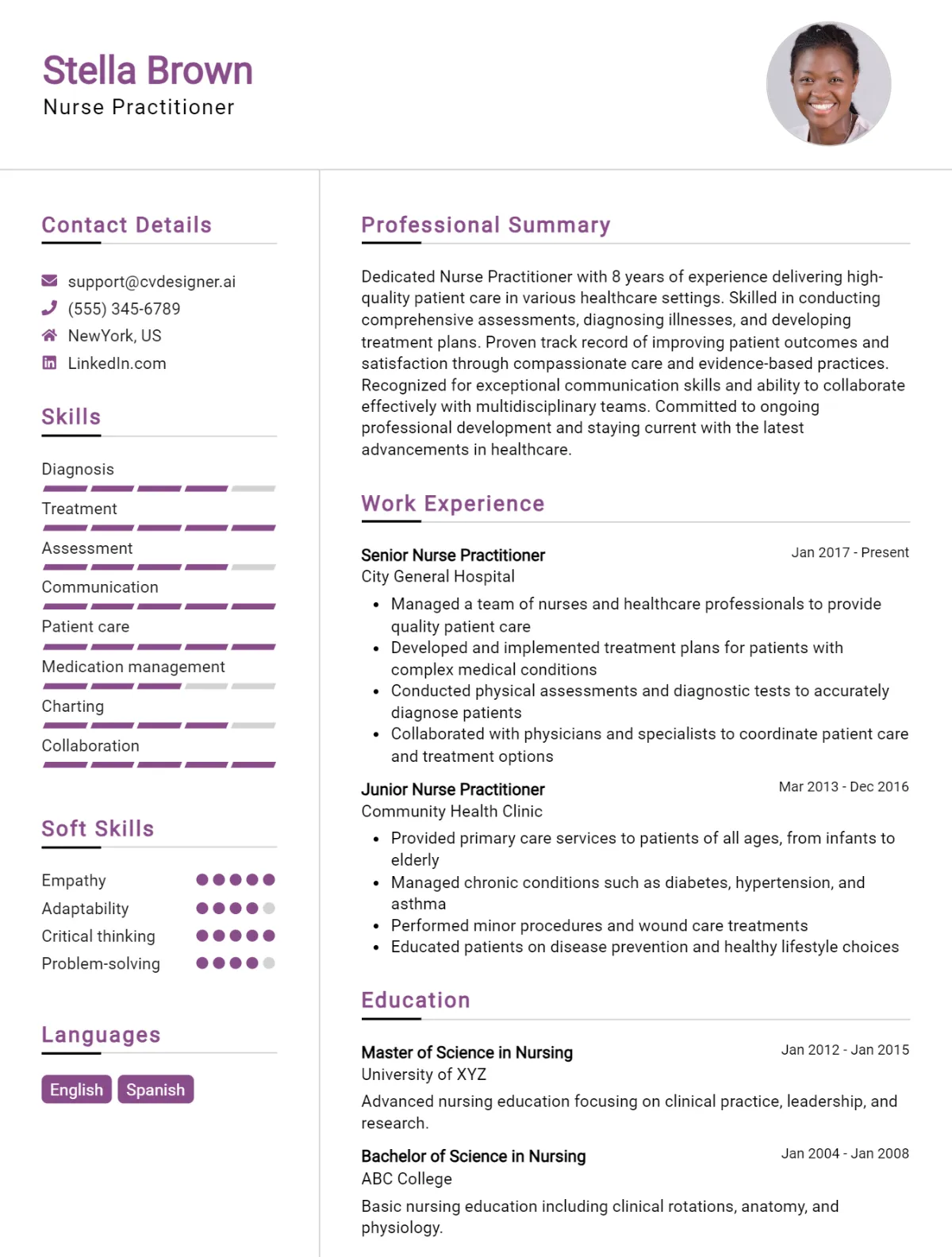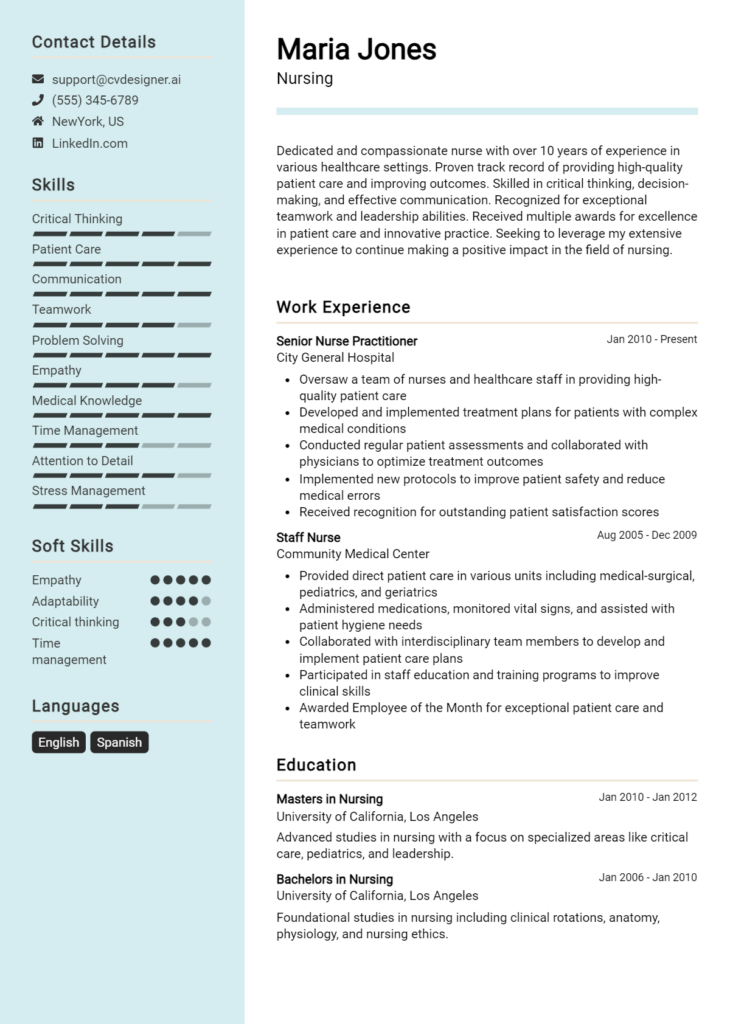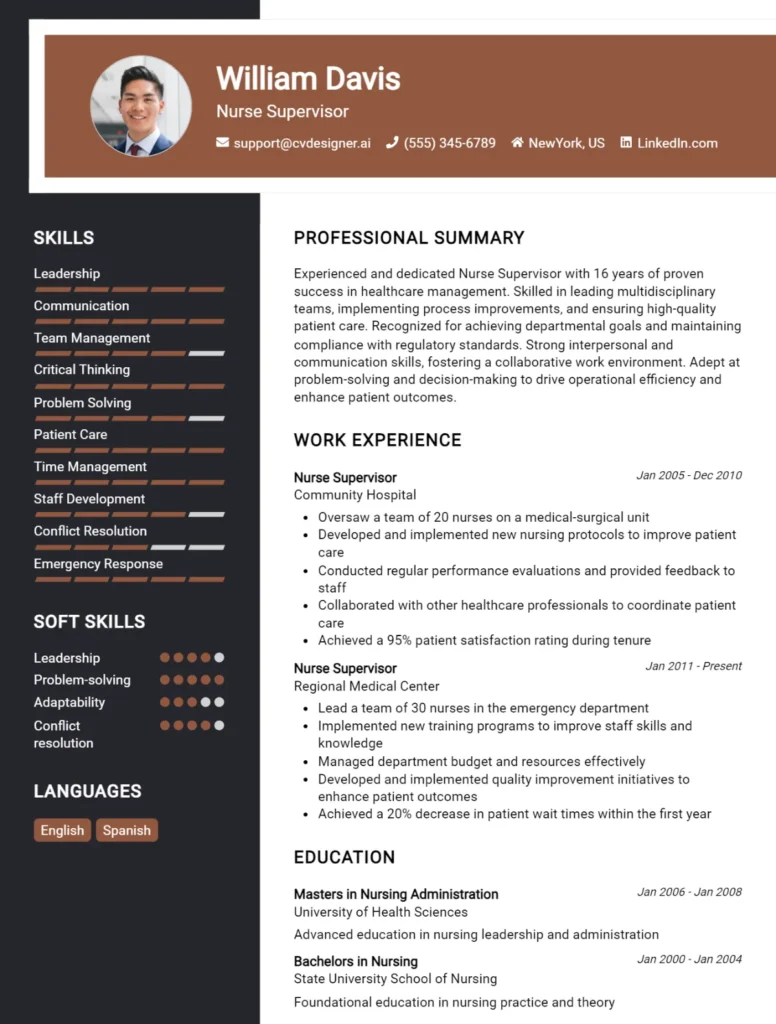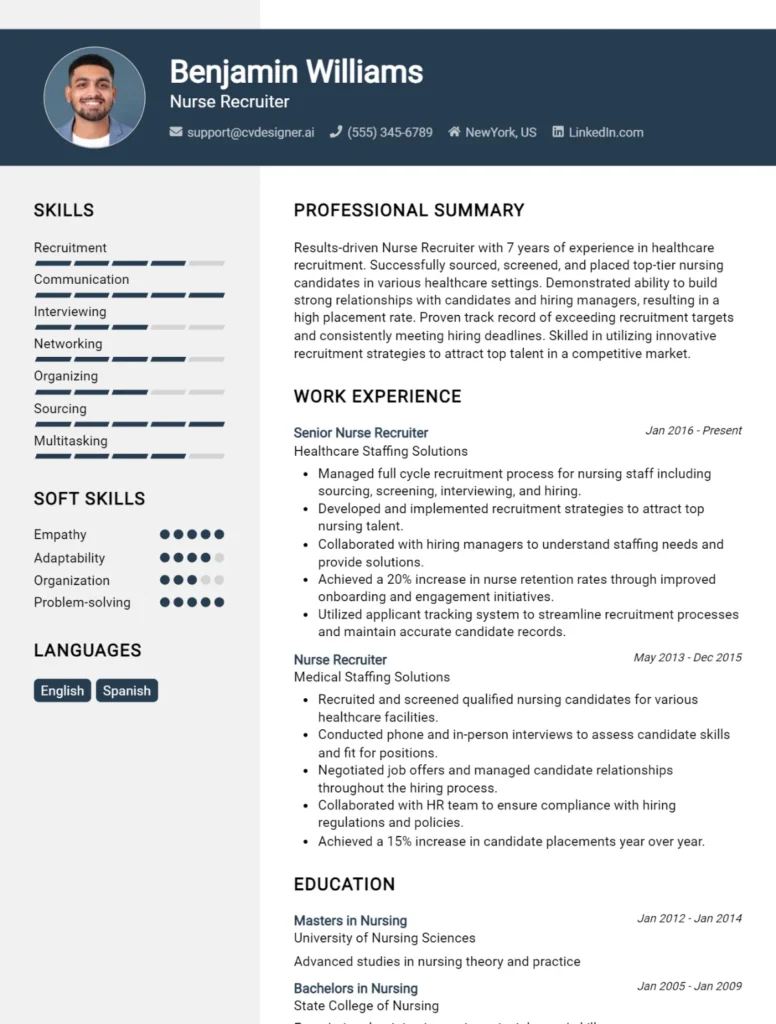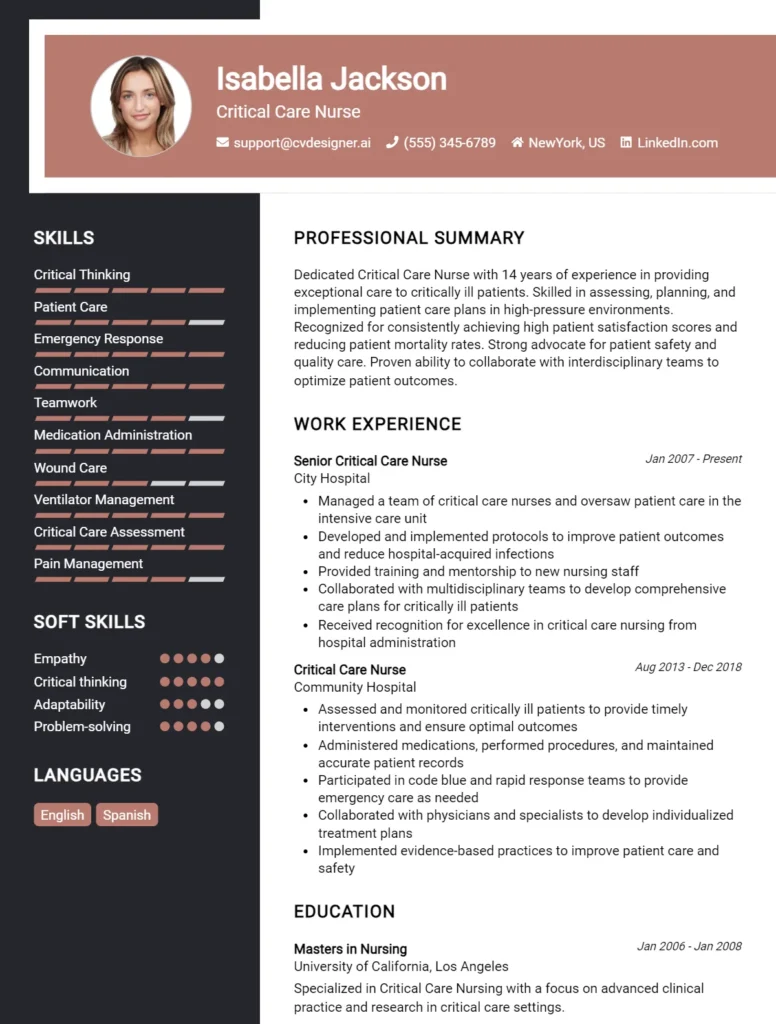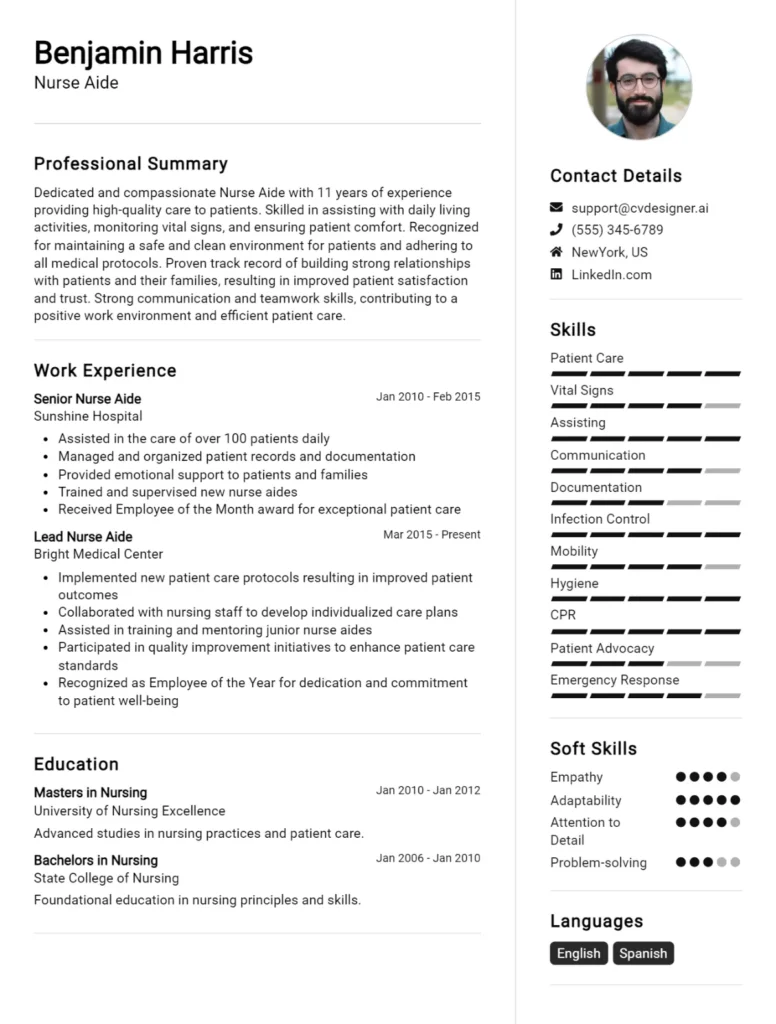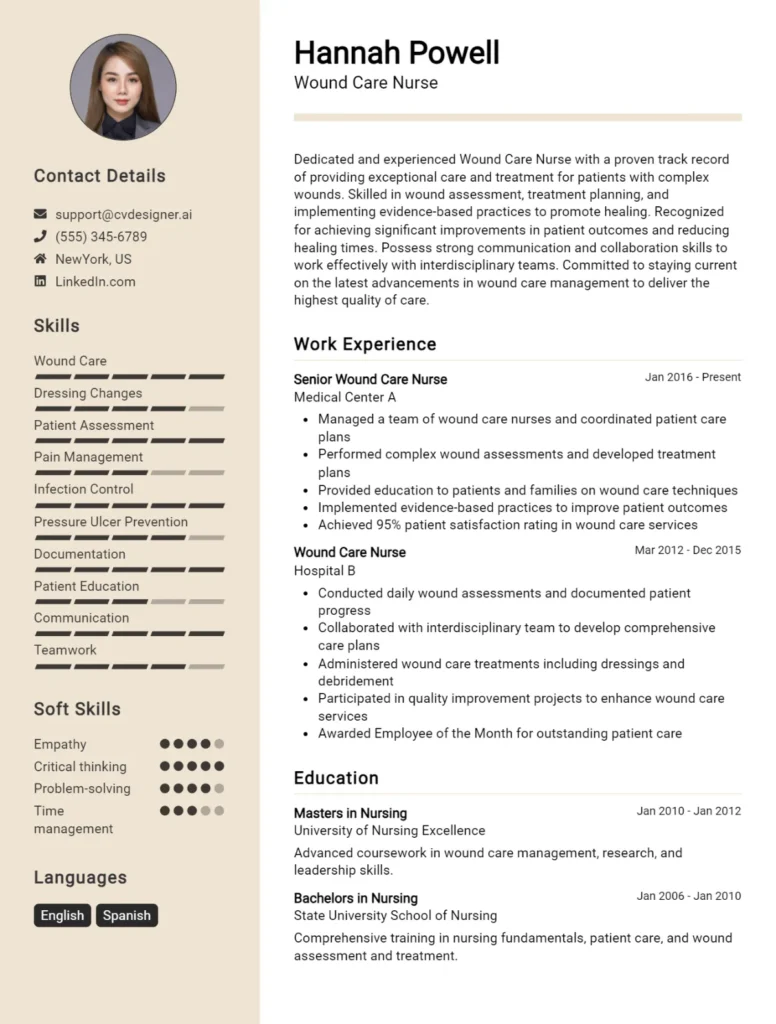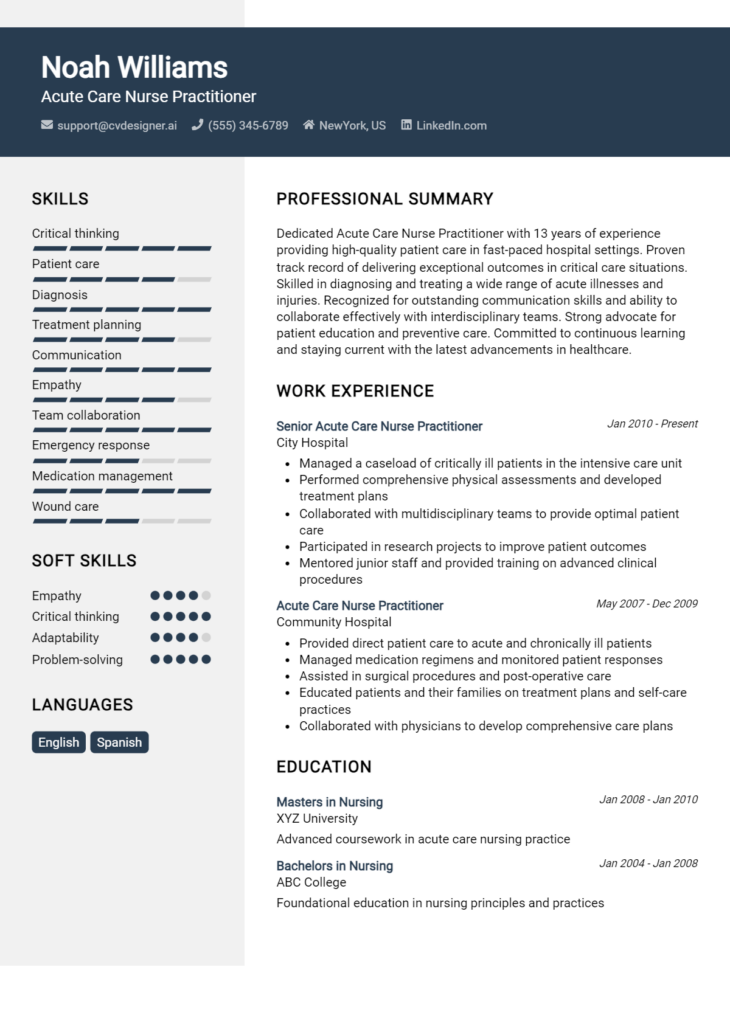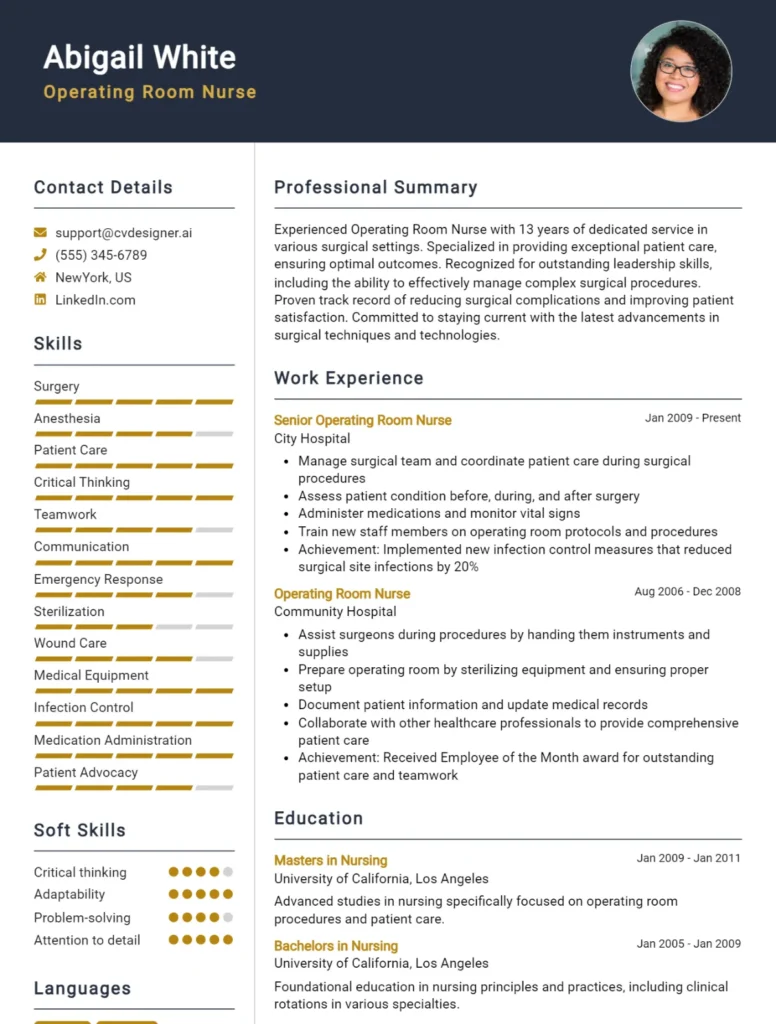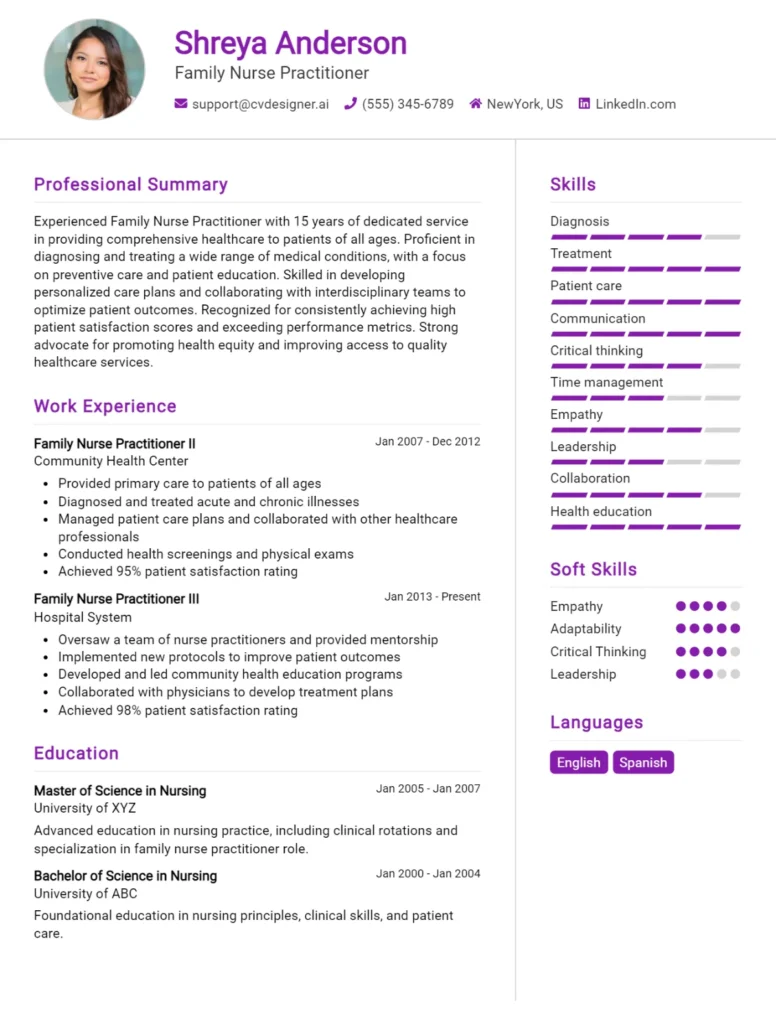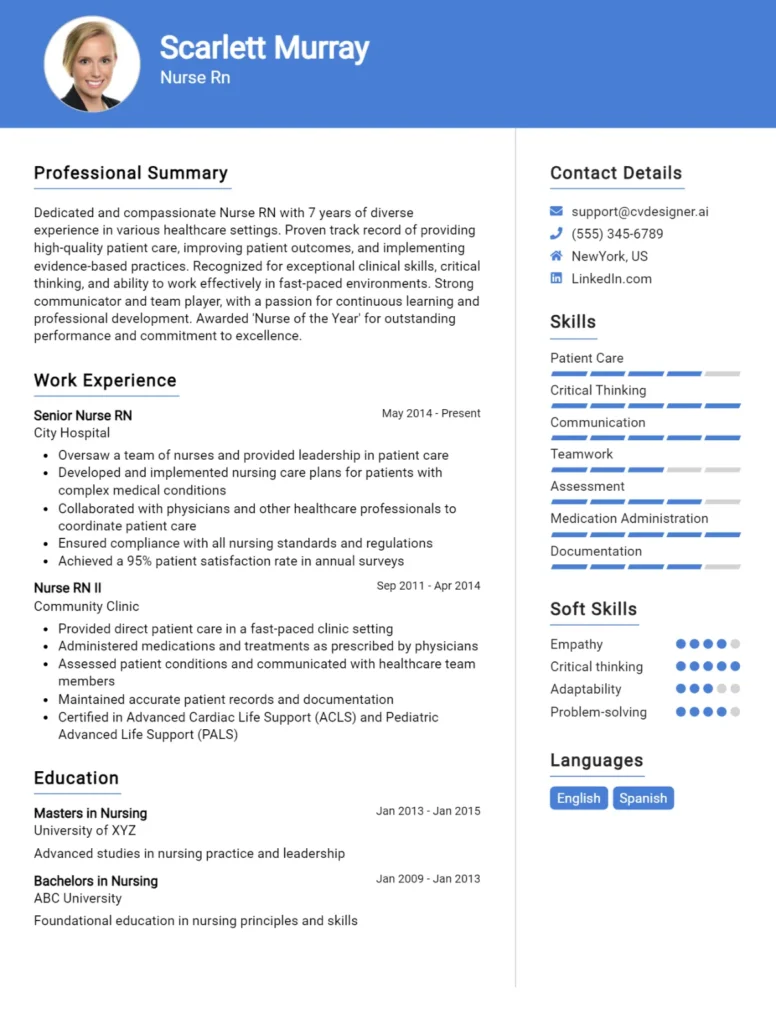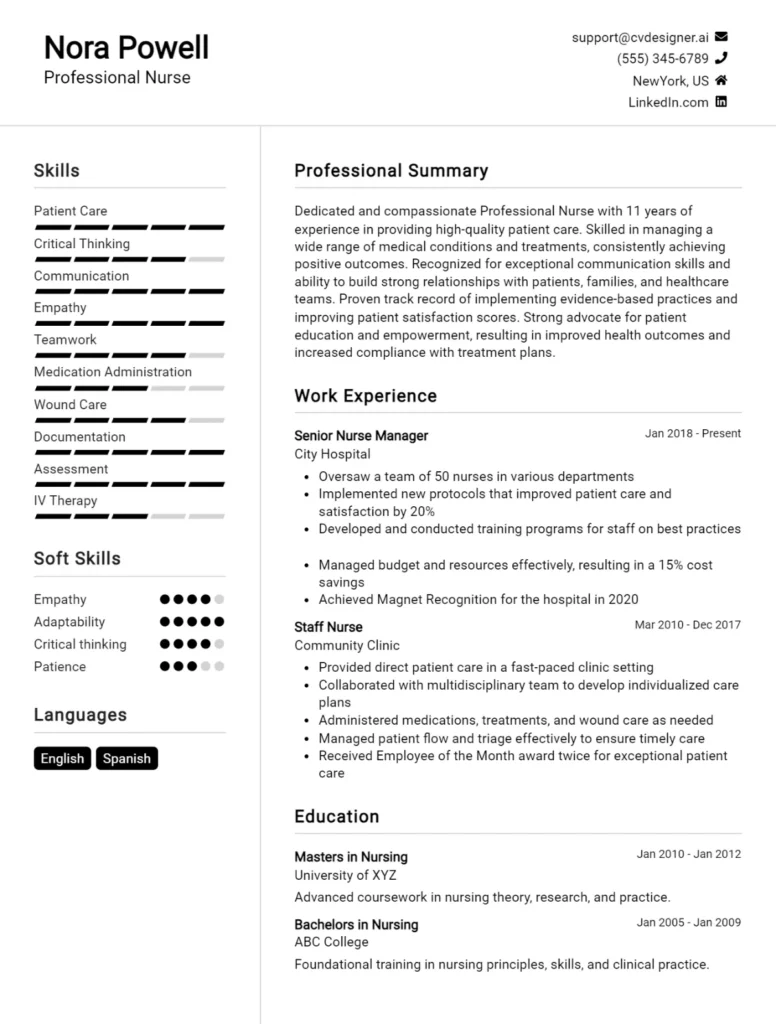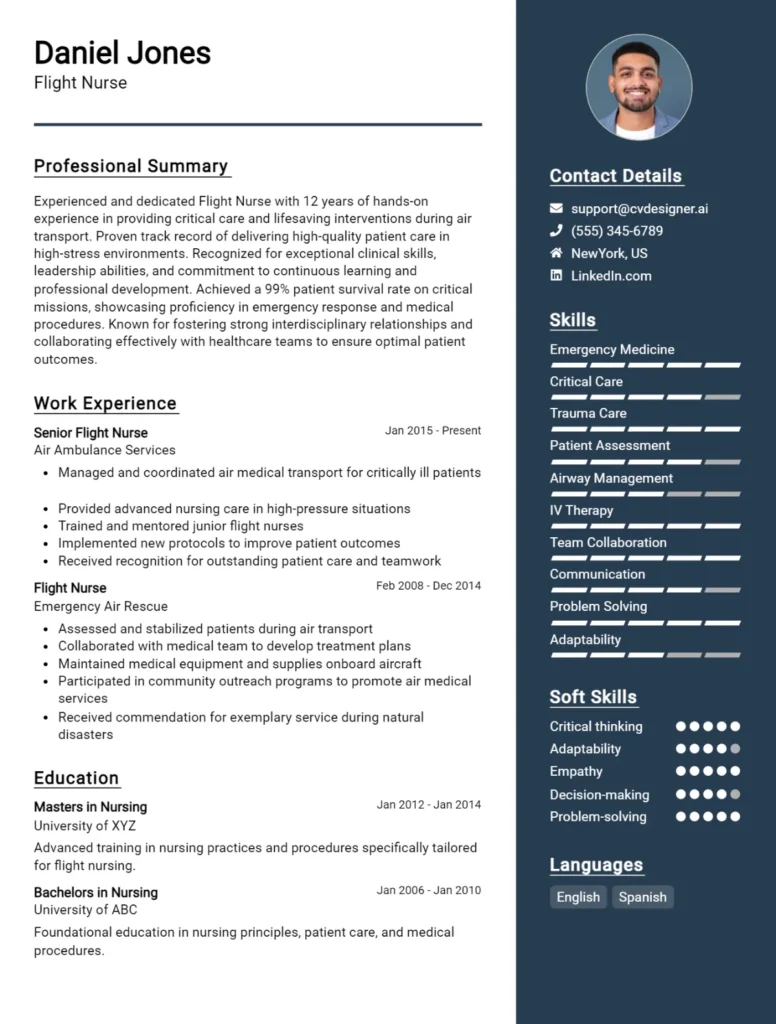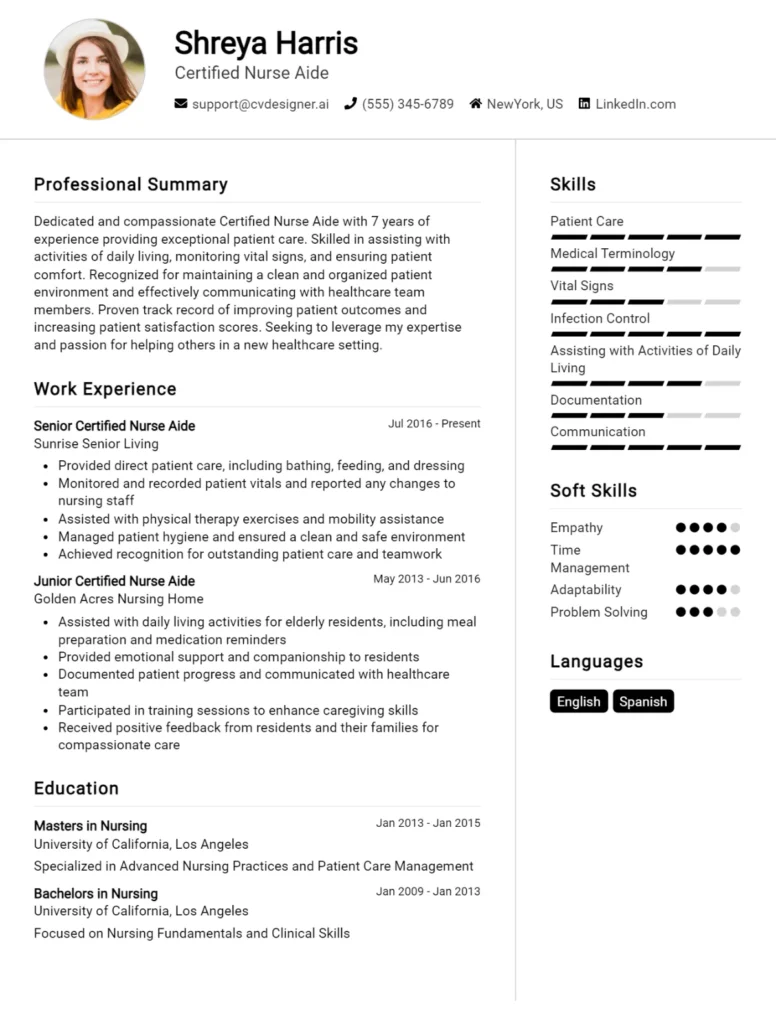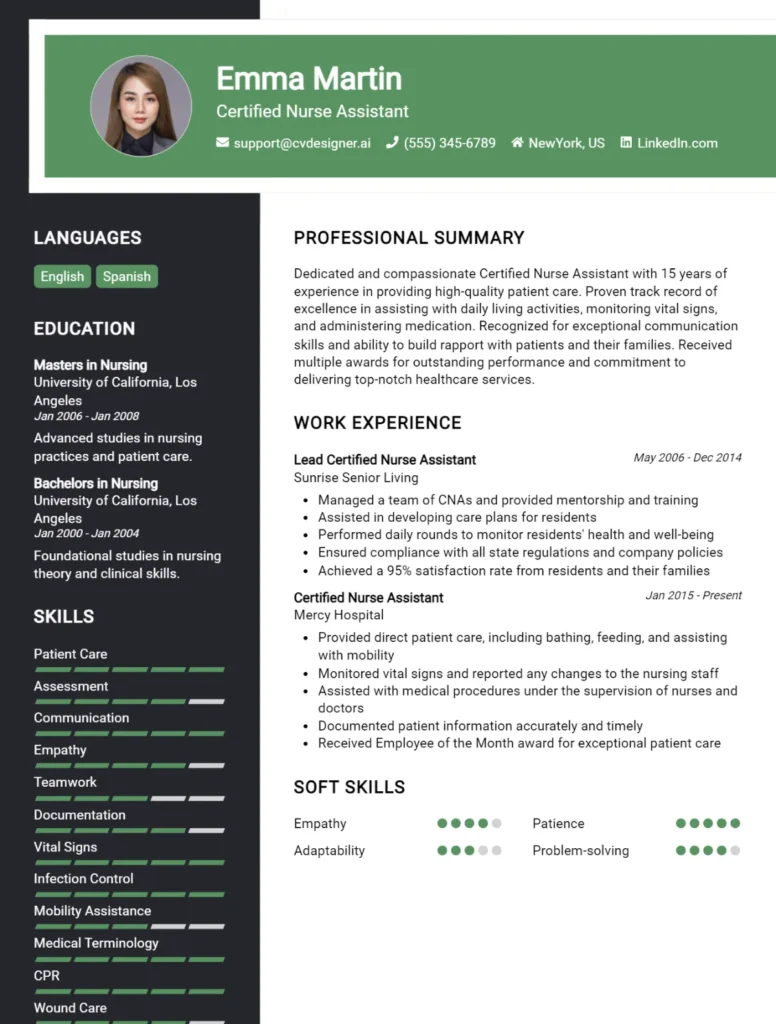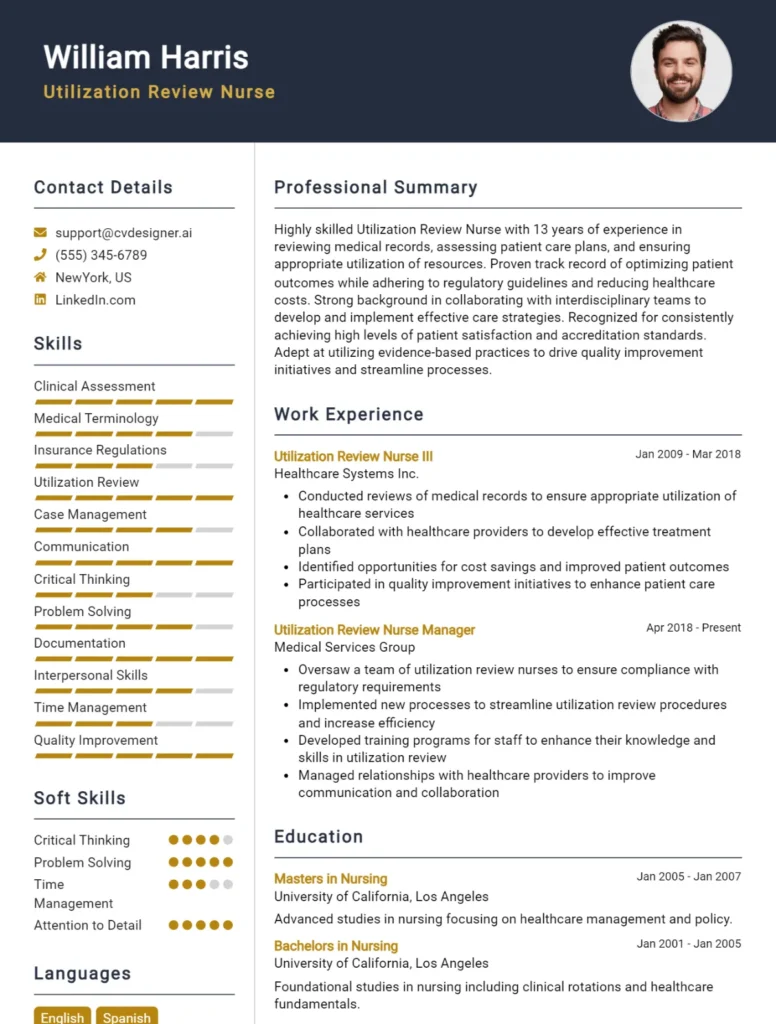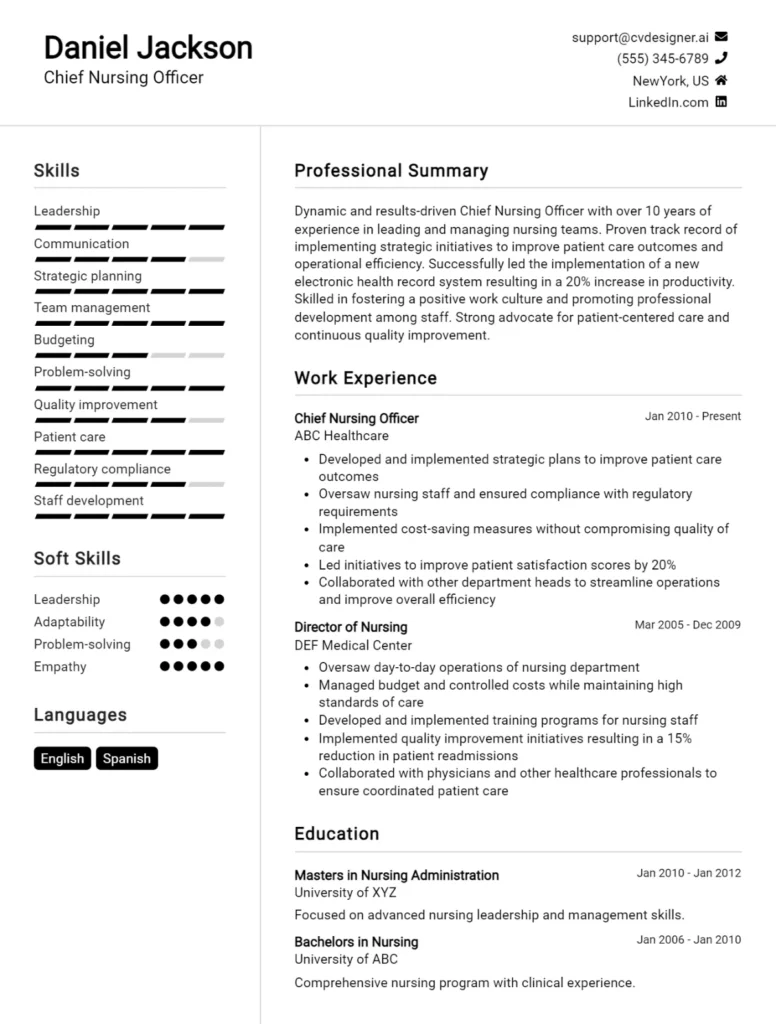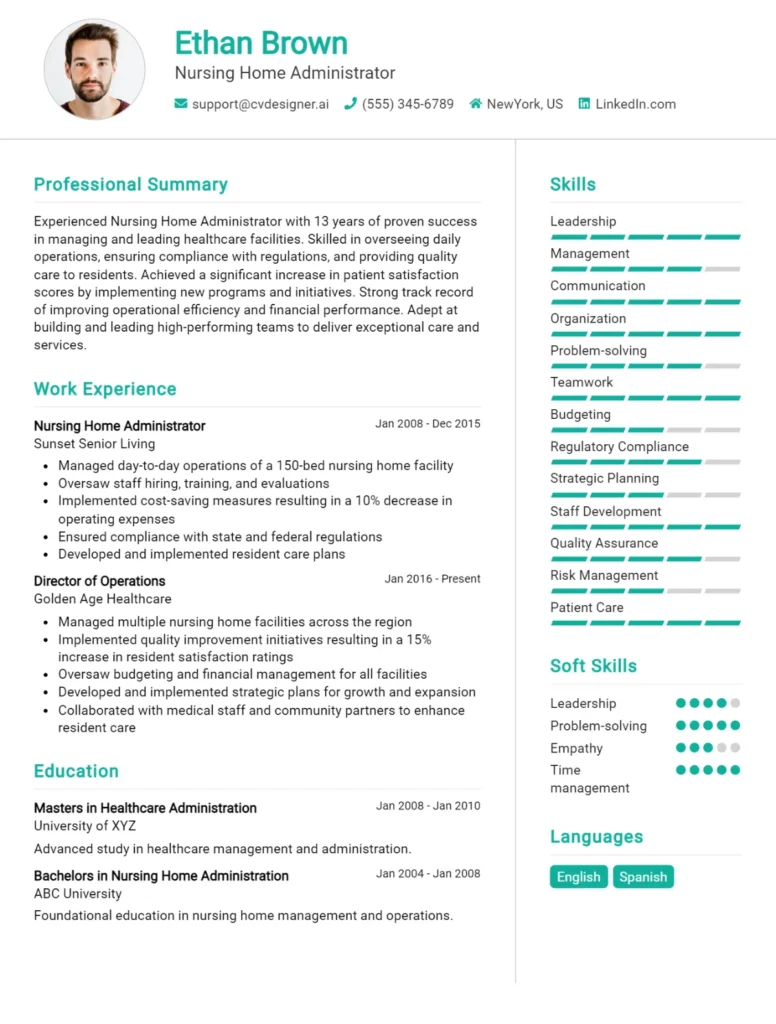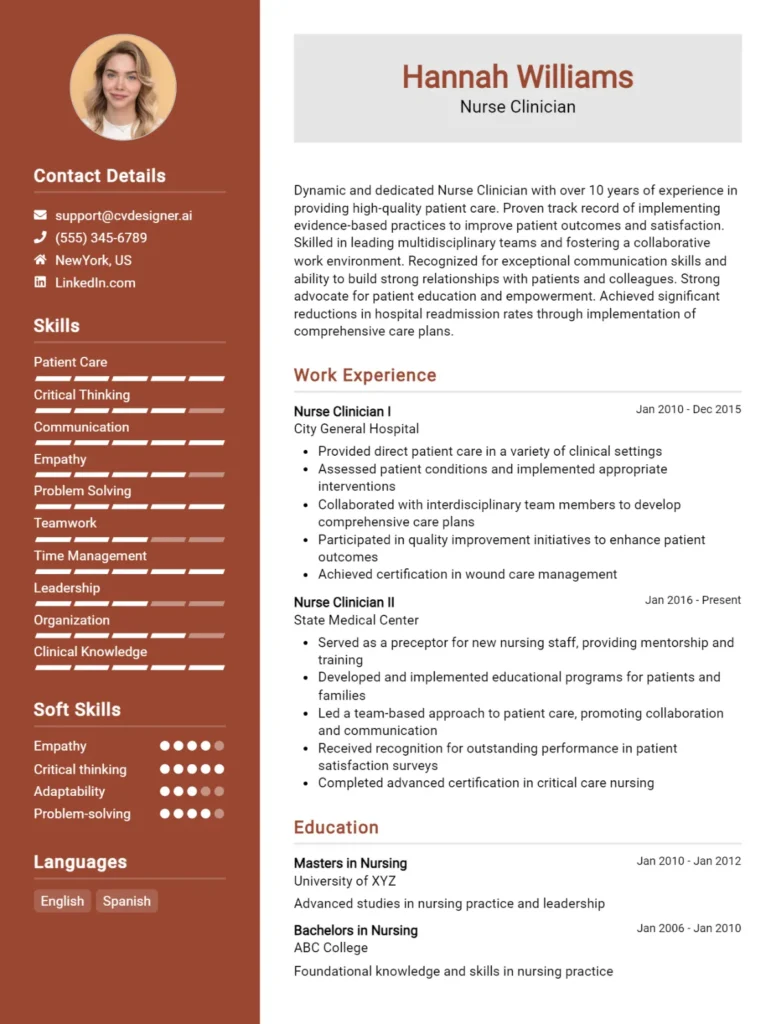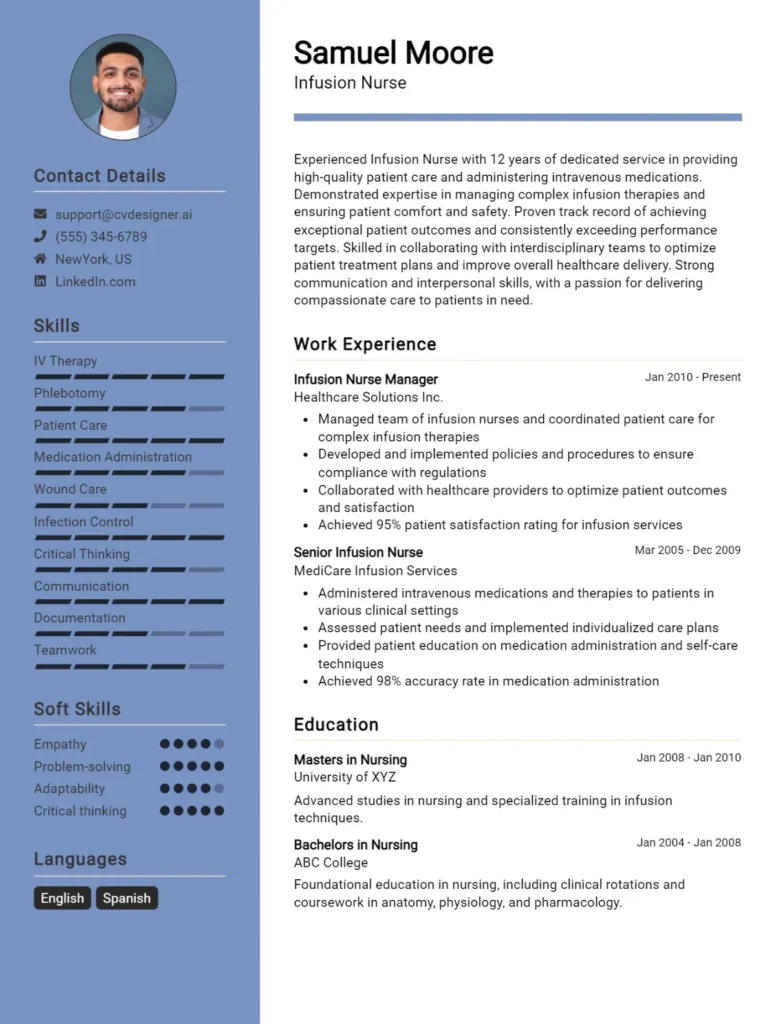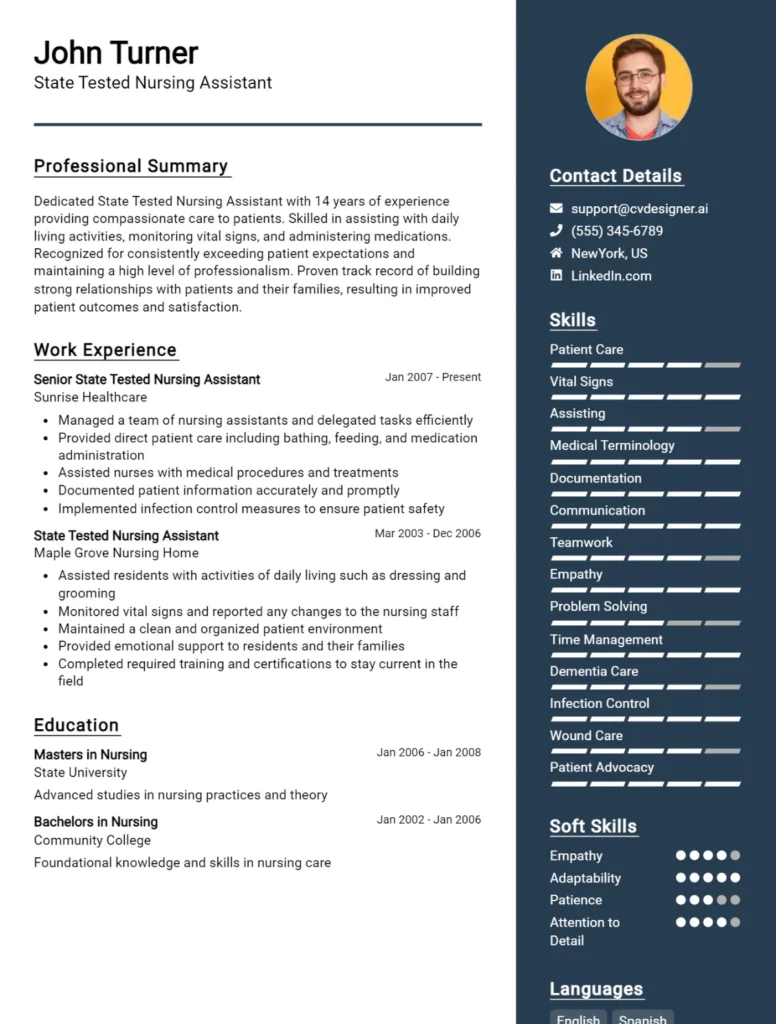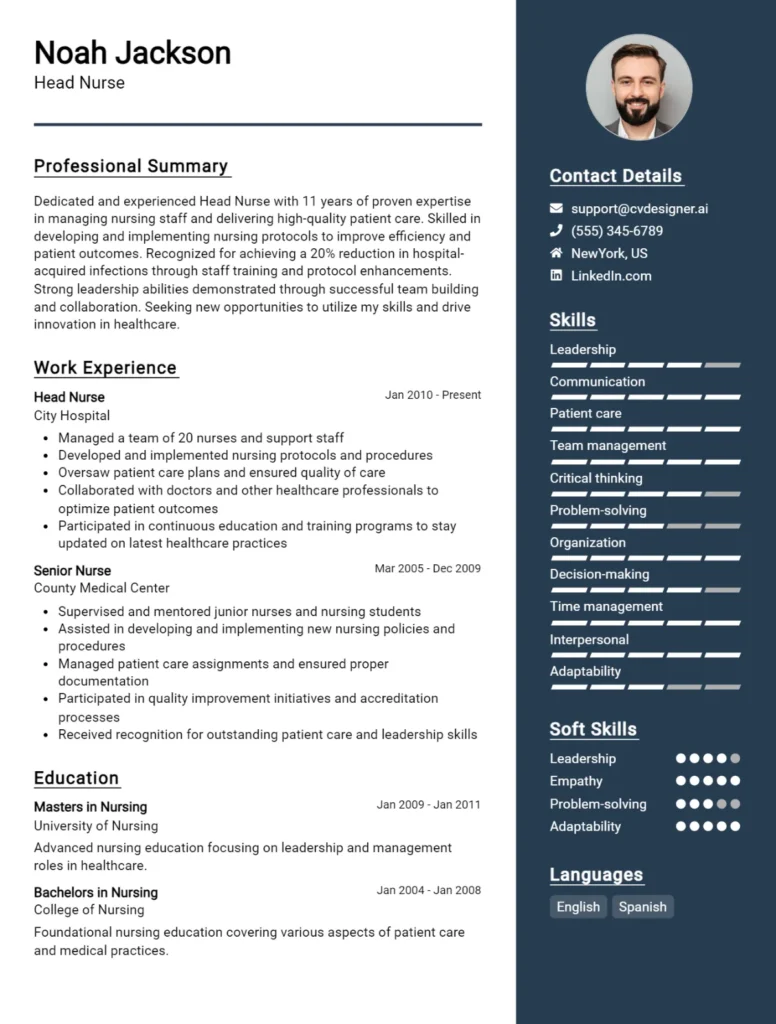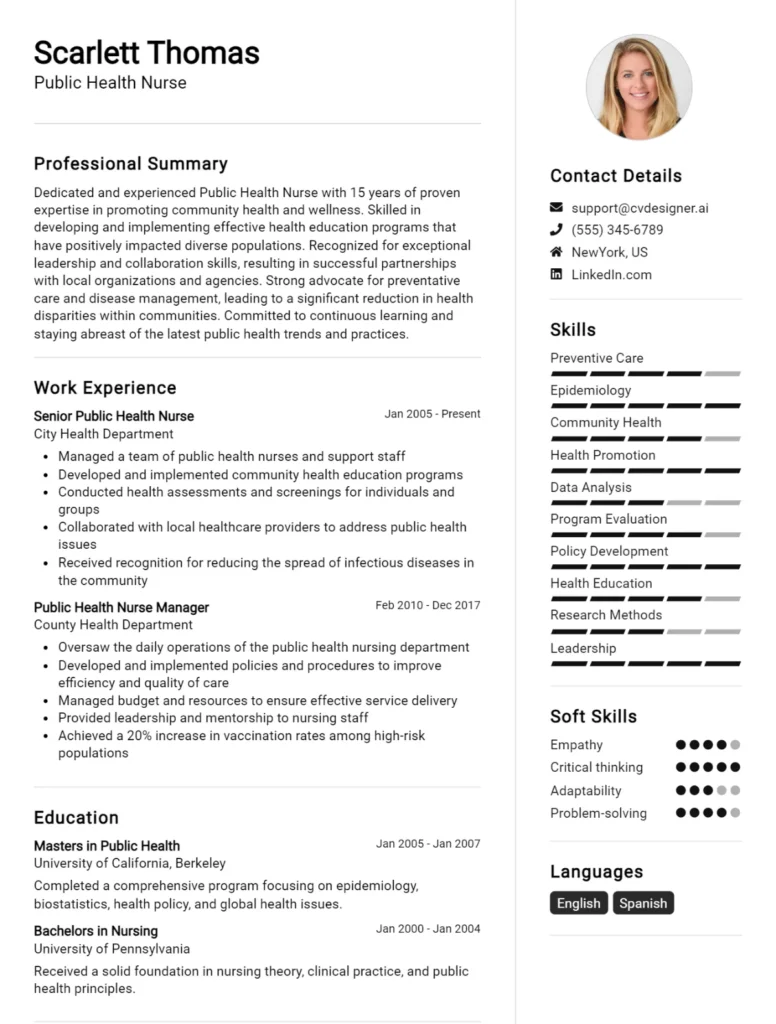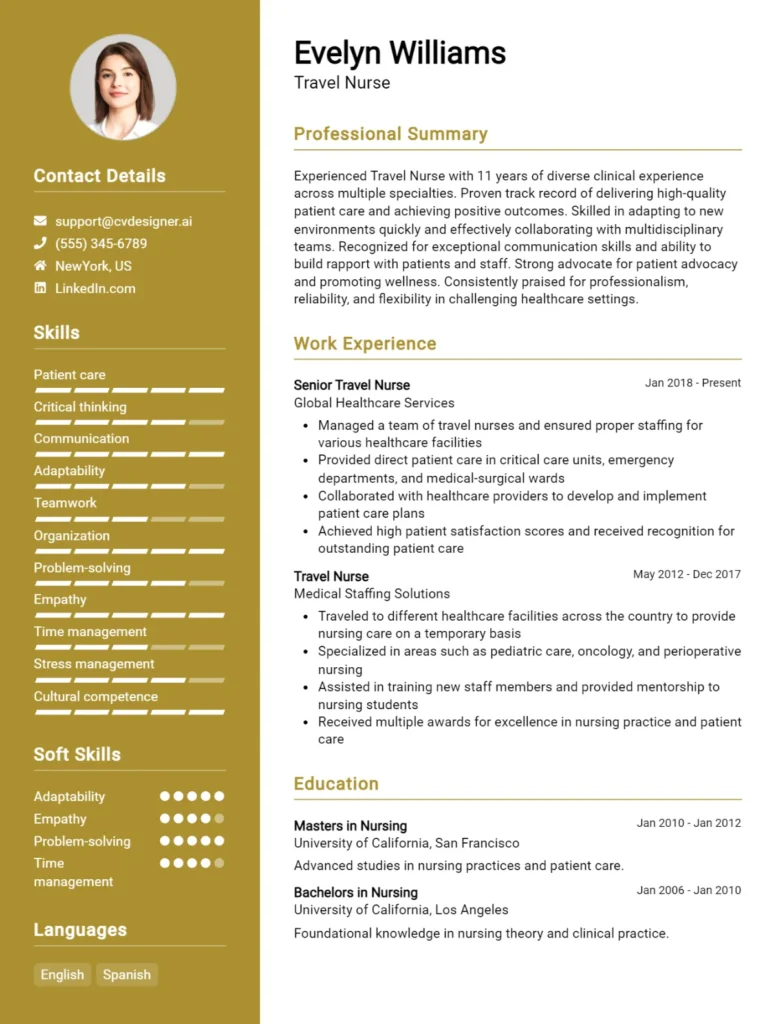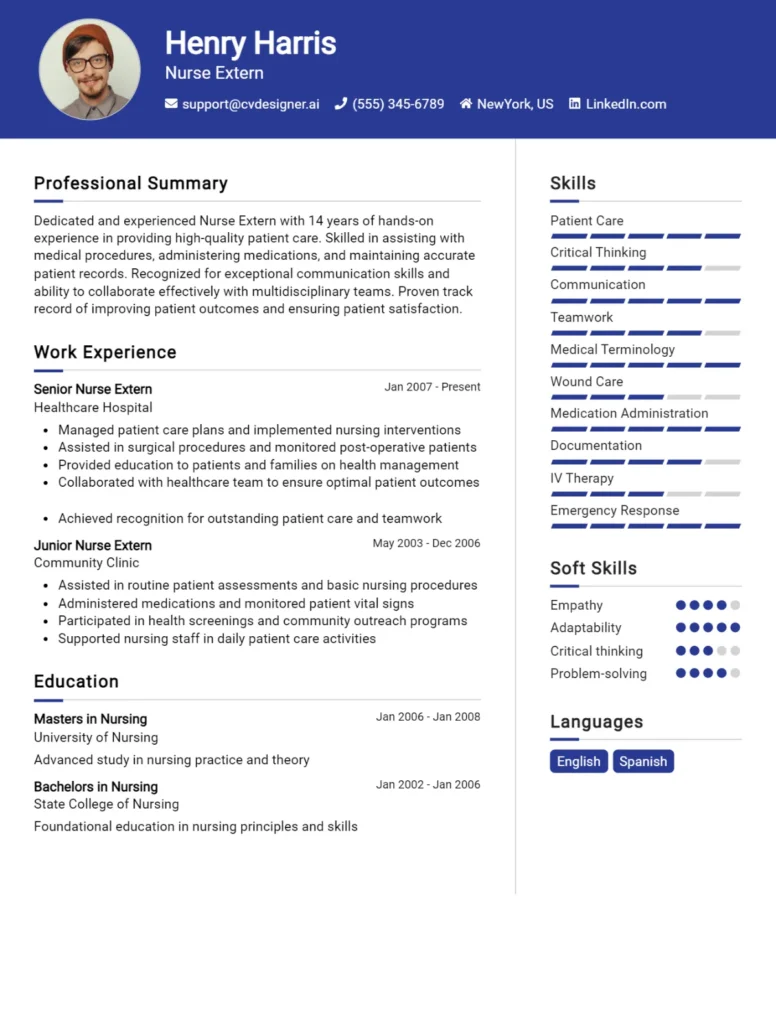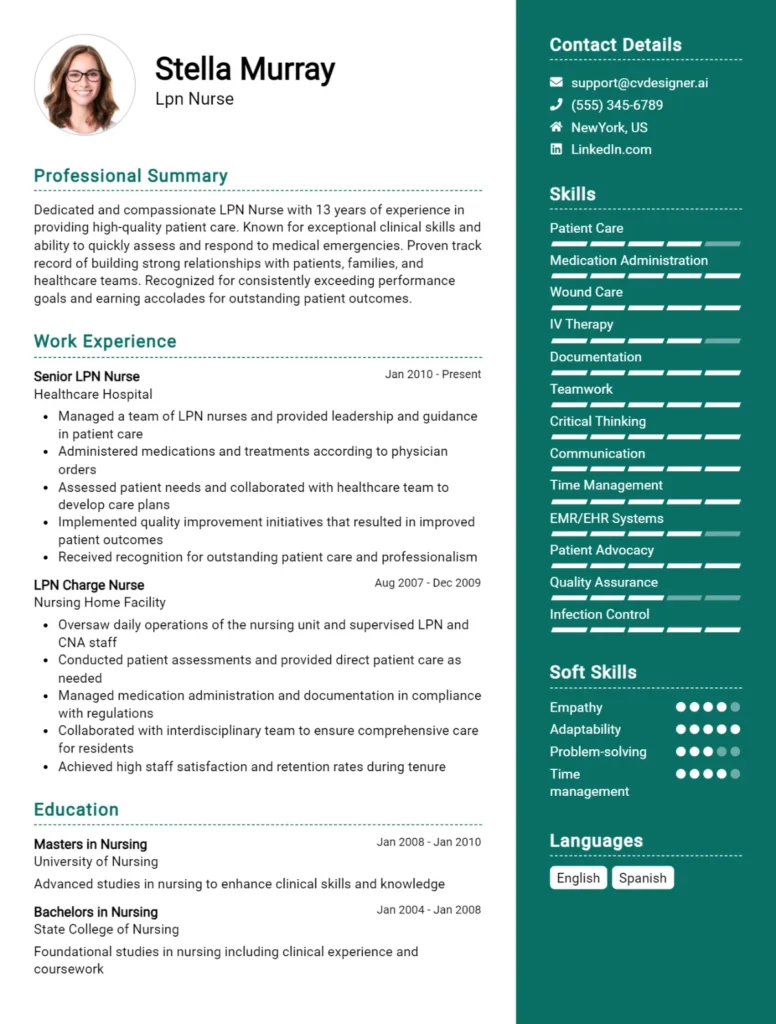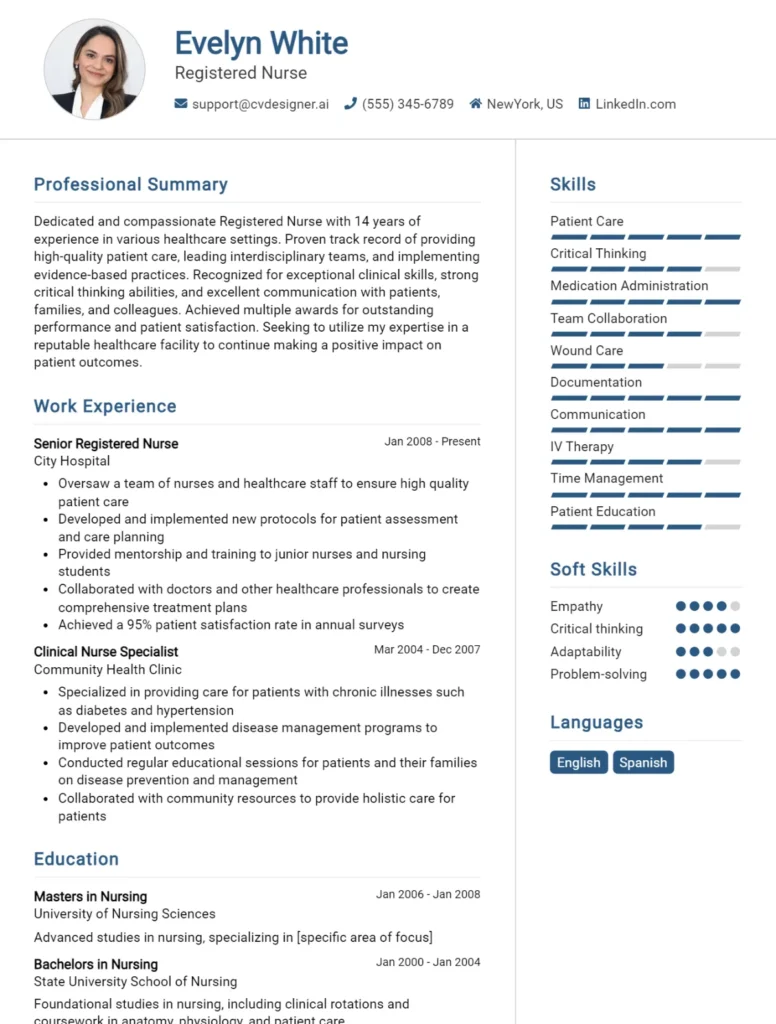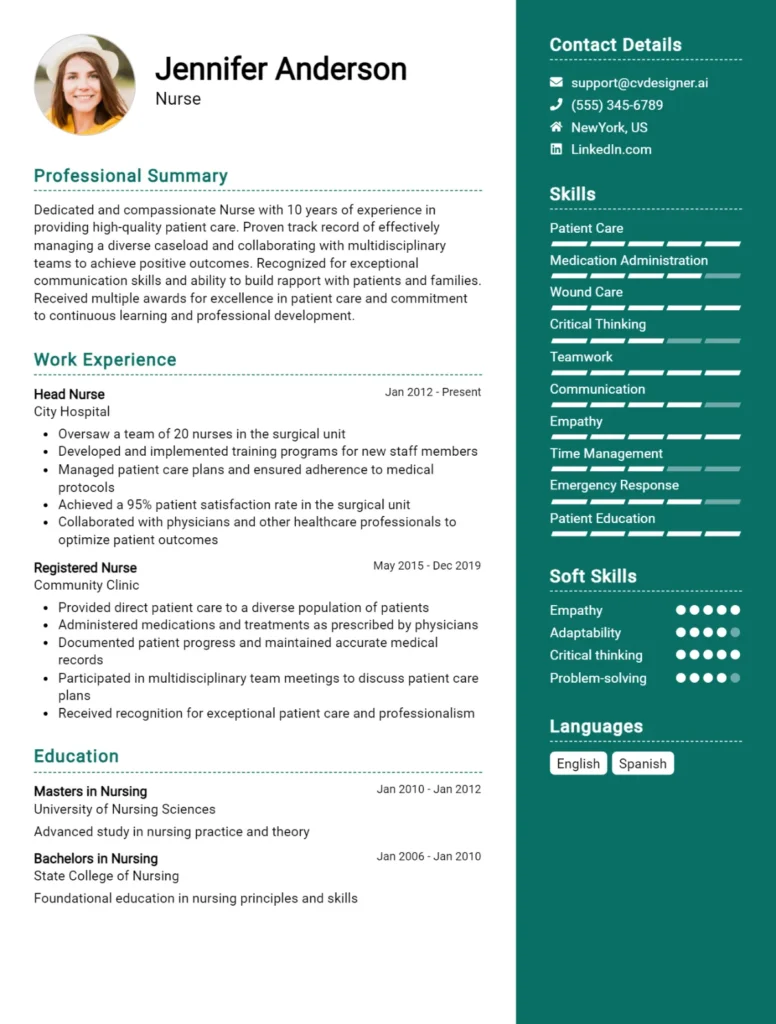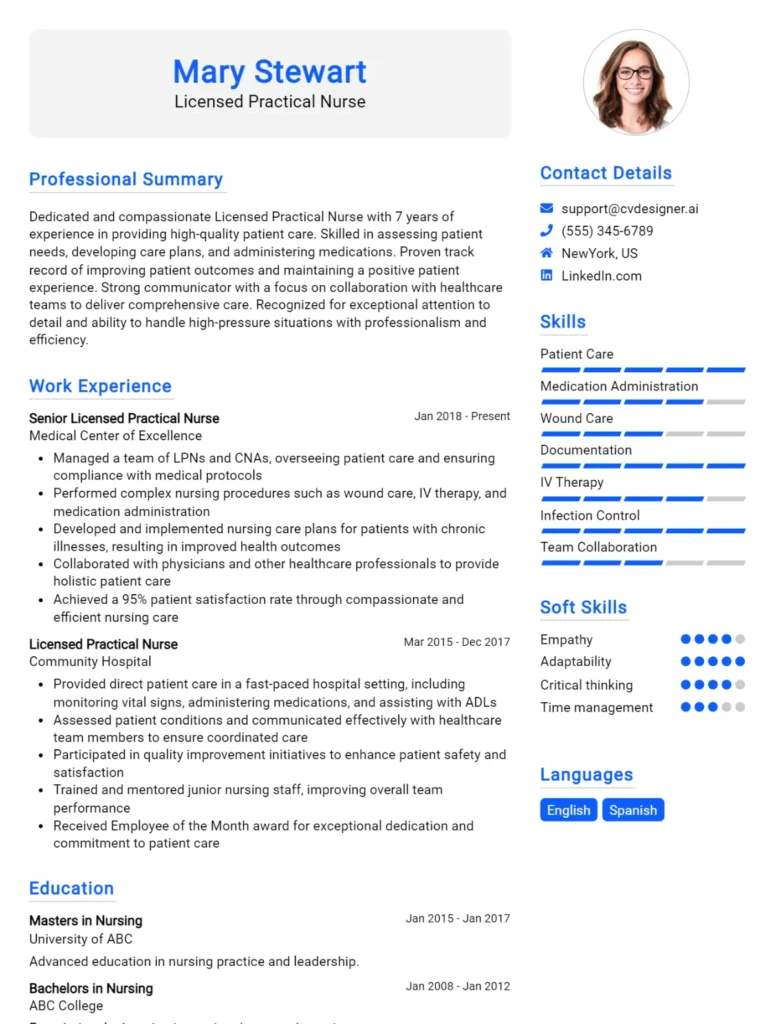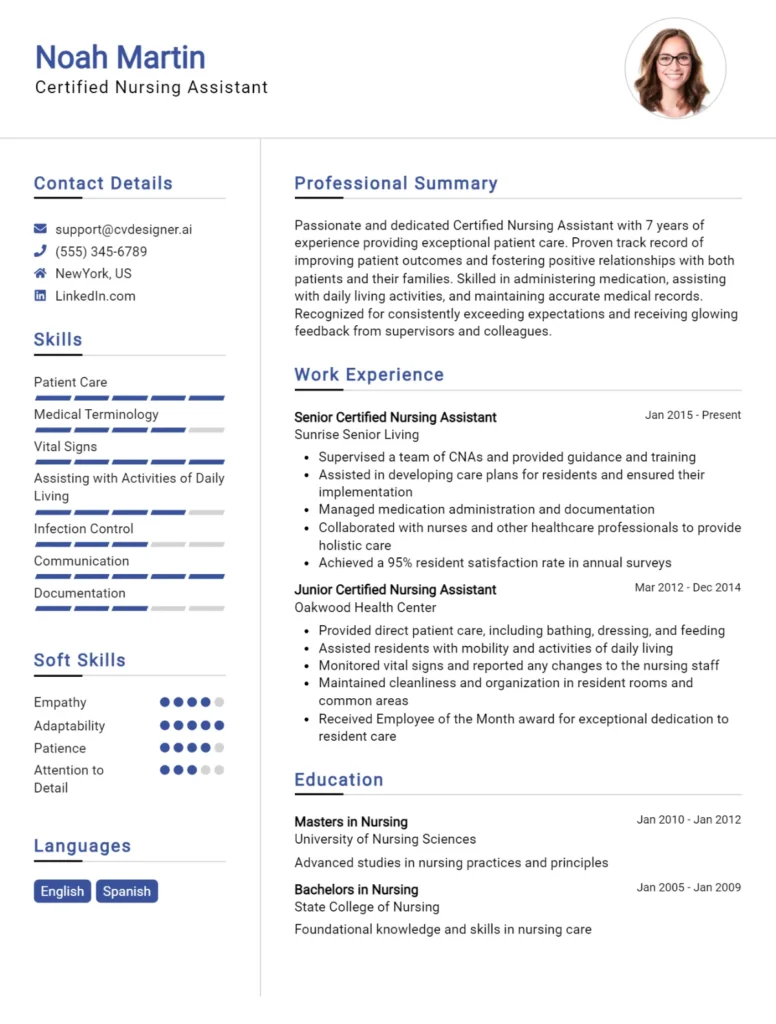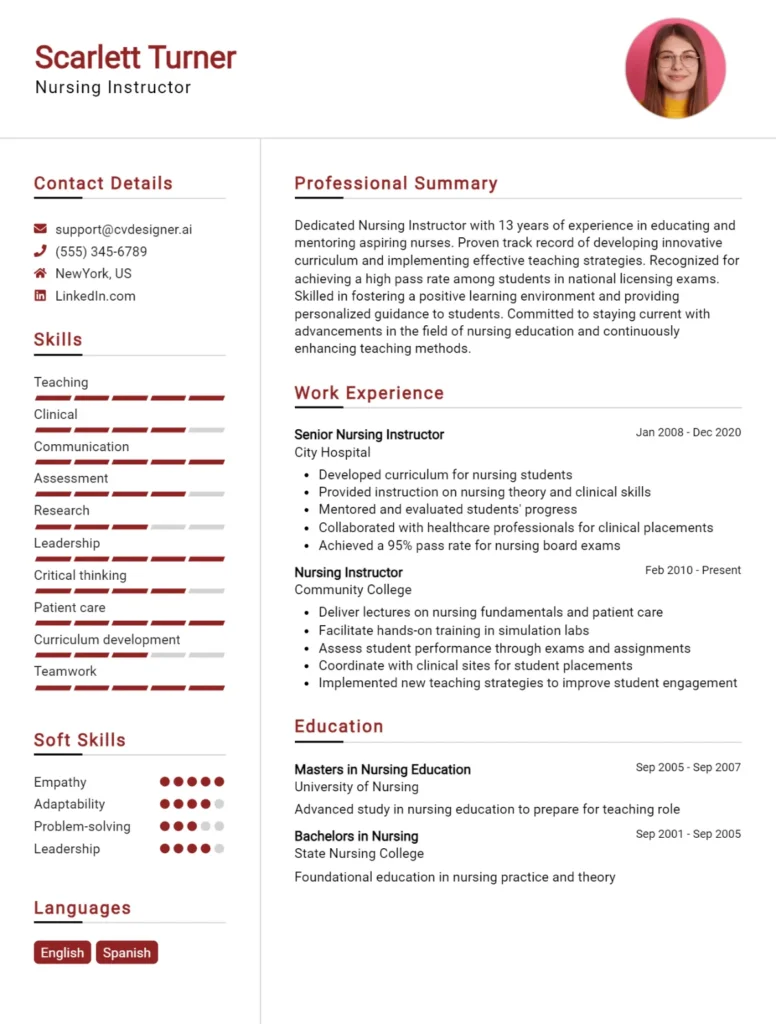Most Popular Nurse Practitioner CV Examples
Explore additional Nurse Practitioner CV samples and guides and see what works for your level of experience or role.
As a Nurse Practitioner, your CV is your professional calling card, showcasing your skills, experience, and dedication to patient care. Crafting an impactful CV can set you apart in a competitive job market, making it essential to highlight your qualifications effectively. This guide will walk you through the nuances of creating a standout Nurse Practitioner CV, complete with a practical example. By the end of this article, you will have a clear understanding of how to present your expertise in a compelling manner. Here are some key points we’ll cover:
- Understanding the CV structure: Learn how to organize your CV for maximum impact.
- Tailoring your CV for specific roles: Discover how to customize your CV for different job applications.
- Showcasing clinical skills and specialties: Tips on highlighting your unique skills and areas of expertise.
- Including relevant certifications and education: Learn the best way to present your qualifications.
- Writing a strong personal statement: Craft a compelling introduction that captures your professional ethos.
- Common mistakes to avoid: Identify pitfalls that could undermine your CV's effectiveness.
- CV example: Review a sample CV to see these tips in action.
Get ready to transform your CV into a powerful tool that opens doors to exciting career opportunities in the nursing field!
What is a Nurse Practitioner CV?
A Nurse Practitioner CV is a crucial document that outlines a nurse practitioner's education, clinical experience, skills, and certifications. This comprehensive representation not only details their qualifications but also highlights their ability to provide high-quality patient care. A well-structured CV is essential for showcasing the unique competencies that nurse practitioners possess, such as advanced clinical skills, diagnostic abilities, and a deep understanding of patient management. Crafting a compelling CV can significantly enhance a candidate's chances of securing an interview in a competitive job market, making it vital for professional advancement.
The importance of a Nurse Practitioner CV extends beyond mere documentation of qualifications; it serves as a powerful marketing tool for the individual. A strong CV can effectively communicate the practitioner's expertise and passion for patient care, setting them apart from other candidates. Utilizing resources like a cv writing guide can assist nurse practitioners in creating a tailored CV that aligns with job requirements. Additionally, employing a cv maker can streamline the process, ensuring that the final product is polished and professional. In essence, a well-crafted CV is not only a reflection of a nurse practitioner's skills but also a stepping stone toward achieving their career goals.
Key Components of a Nurse Practitioner CV
- Contact Information: Include your full name, phone number, email address, and LinkedIn profile or professional website.
- Professional Summary: A brief overview of your qualifications, experience, and career goals tailored to the Nurse Practitioner role.
- Education: List your degrees, including the institution names, locations, and graduation dates. Highlight any specialized training or certifications relevant to nursing.
- Licensure and Certifications: Detail your Nurse Practitioner license, state licensure, and any additional certifications such as ACLS, PALS, or specialty certifications.
- Clinical Skills: Highlight your clinical competencies and skills relevant to the Nurse Practitioner role. For a comprehensive list of skills, refer to skills.
- Work Experience: Outline your professional history, focusing on roles related to nursing and healthcare. Include job titles, employer names, dates of employment, and key responsibilities. For guidance on structuring this section, see work experience.
- Professional Affiliations: Mention memberships in nursing organizations or associations, such as the American Association of Nurse Practitioners (AANP).
- Continuing Education: Include any recent courses, workshops, or conferences attended that are relevant to your nursing practice.
- Research and Publications: If applicable, list any research projects, studies, or publications you've contributed to in the field of nursing or healthcare.
- Volunteer Experience: Highlight any volunteer roles that demonstrate your commitment to community service or healthcare, particularly in underserved populations.
- Awards and Honors: Mention any awards or recognitions received in your nursing career, which can enhance your professional credibility.
- References: Provide a list of professional references who can vouch for your qualifications and work ethic, or indicate that references are available upon request.
Sample Nurse Practitioner CV for Inspiration
John Doe
123 Healthcare Lane
Cityville, ST 12345
(123) 456-7890
johndoe@email.com
LinkedIn: linkedin.com/in/johndoe
Professional Summary
Dedicated and compassionate Nurse Practitioner with over 5 years of experience in providing high-quality patient care in various healthcare settings. Skilled in assessing patient needs, diagnosing conditions, and developing effective treatment plans. Proven ability to collaborate with interdisciplinary teams to improve patient outcomes. Committed to continuous learning and staying updated with the latest advancements in healthcare.
Work Experience
Nurse Practitioner
Cityville Family Health Clinic, Cityville, ST
January 2020 - Present
- Conduct comprehensive health assessments and develop individualized care plans for a diverse patient population.
- Manage acute and chronic illnesses, emphasizing preventive care and wellness education.
- Collaborate with physicians and other healthcare professionals to coordinate care and enhance patient experiences.
- Perform minor procedures, such as suturing and joint injections, with a focus on patient comfort and safety.
- Implement evidence-based practices to improve clinic protocols, resulting in a 20% increase in patient satisfaction scores.
Registered Nurse
Cityville General Hospital, Cityville, ST
June 2016 - December 2019
- Provided direct patient care in a fast-paced medical-surgical unit, managing a caseload of up to 10 patients.
- Administered medications and treatments as prescribed and monitored patient responses.
- Educated patients and families on disease management, medication adherence, and post-discharge care.
- Participated in quality improvement initiatives, leading to a reduction in hospital-acquired infections by 15%.
Education
Master of Science in Nursing (MSN)
Cityville University, Cityville, ST
Graduated: May 2016
Bachelor of Science in Nursing (BSN)
Cityville University, Cityville, ST
Graduated: May 2014
Skills
- Comprehensive patient assessments
- Chronic disease management
- Health education and promotion
- Strong communication and interpersonal skills
- Proficient in electronic health records (EHR)
- Leadership and team collaboration
- Bilingual: English and Spanish
Certifications
- Board Certified Nurse Practitioner (BCNP)
- Advanced Cardiovascular Life Support (ACLS)
- Basic Life Support (BLS)
- Pediatric Advanced Life Support (PALS)
Publications
Doe, J. (2023). "The Importance of Preventive Care in Primary Practice." Journal of Nursing Practice, 12(3), 45-52.
Doe, J. (2022). "Managing Chronic Pain: New Approaches in Treatment." American Journal of Nursing, 122(4), 58-65.
Professional Affiliations
- American Association of Nurse Practitioners (AANP)
- National Nurse Practitioner Association (NNPA)
- Sigma Theta Tau International Honor Society of Nursing
References
Available upon request.
Nurse Practitioner CV Writing Tips
When crafting a CV as a Nurse Practitioner, it's essential to highlight both your clinical expertise and your interpersonal skills. Start by tailoring your CV to the specific job you are applying for, focusing on relevant experiences and qualifications that match the job description. Use clear, concise language and a professional format to ensure that your CV is easy to read. Additionally, emphasize your certifications, licenses, and any continuing education that showcases your commitment to the field. Remember to include details about your clinical rotations, specialties, and any unique patient care strategies you employ, as these will set you apart from other candidates.
CV Writing Tips for Nurse Practitioners
- Tailor Your CV: Customize your CV for each position to reflect the specific skills and experiences relevant to the job description.
- Highlight Clinical Skills: Clearly outline your clinical skills, including any specialties, procedures, and technologies you are proficient in.
- Include Certifications: List all relevant certifications and licenses, ensuring they are current and displayed prominently.
- Showcase Continuing Education: Mention any courses, workshops, or conferences you have attended that enhance your qualifications.
- Emphasize Soft Skills: Highlight interpersonal skills such as communication, empathy, and teamwork, which are crucial for patient care.
- Quantify Achievements: Use numbers and statistics to demonstrate your impact, such as patient satisfaction scores or improvements in care delivery.
- Professional Summary: Start with a compelling summary that encapsulates your experience, skills, and career goals.
- Keep Formatting Clean: Use a simple, professional layout with clear headings, bullet points, and consistent font size for easy readability.
Nurse Practitioner CV Summary Examples
As a Nurse Practitioner, crafting a compelling CV summary is essential to showcase your skills, experience, and dedication to patient care. Below are several examples that highlight the diverse qualifications and attributes of Nurse Practitioners, tailored to different career focuses and settings.
Compassionate and detail-oriented Nurse Practitioner with over 5 years of experience in primary care settings. Proven ability to develop individualized treatment plans and deliver high-quality patient care. Committed to enhancing patient outcomes through evidence-based practices and patient education.
Dynamic Nurse Practitioner with a strong background in family medicine and preventive care. Adept at building lasting relationships with patients and collaborating with multidisciplinary teams to improve health services. Passionate about promoting health and wellness within the community.
Dedicated Nurse Practitioner specializing in acute care with 8 years of experience in fast-paced emergency departments. Excellent clinical skills and a strong ability to remain calm under pressure, ensuring the best possible outcomes for critically ill patients. Recognized for outstanding patient advocacy and teamwork.
Results-driven Nurse Practitioner with expertise in pediatrics and a commitment to providing comprehensive healthcare services to children and families. Skilled in performing assessments, diagnosing conditions, and developing treatment plans. Known for exceptional communication skills that foster trust and rapport with young patients and their families.
Experienced Nurse Practitioner with a focus on geriatrics and chronic disease management. Over 6 years of experience in long-term care facilities, dedicated to improving the quality of life for elderly patients. Strong advocate for patient rights and education, ensuring that families are informed and involved in care decisions.
Build a Strong Experience Section for Your Nurse Practitioner CV
As a Nurse Practitioner, showcasing your experience effectively is crucial to stand out in a competitive job market. Your experience section should highlight your clinical skills, patient care abilities, and any specialties or areas of expertise. Below are examples of strong work experience descriptions that can be tailored to fit your individual background.
- Provided comprehensive primary care to a diverse patient population, managing acute and chronic conditions while ensuring a patient-centered approach to treatment.
- Conducted thorough physical examinations and health assessments, utilizing evidence-based practices to develop individualized care plans for patients aged 18 and older.
- Collaborated with interdisciplinary teams to enhance the quality of patient care, participating in case reviews and contributing to the development of clinical protocols.
- Educated patients and families on disease prevention, management of chronic illnesses, and healthy lifestyle choices, resulting in improved patient compliance and health outcomes.
- Implemented and monitored treatment regimens for patients with diabetes, hypertension, and other chronic conditions, achieving a 20% improvement in patient health metrics over a six-month period.
- Utilized advanced diagnostic skills to interpret laboratory results and imaging studies, leading to timely and accurate clinical decisions.
- Spearheaded initiatives for quality improvement and patient safety, including the development of a new patient follow-up protocol that reduced readmission rates by 15%.
- Mentored and supervised nursing students and new staff, providing guidance in clinical procedures and fostering a collaborative learning environment.
Nurse Practitioner CV Education Examples
As a Nurse Practitioner (NP), a strong educational background is essential to providing high-quality patient care and effectively managing complex health conditions. Below are several examples of educational qualifications that are relevant to the role of a Nurse Practitioner:
- Master of Science in Nursing (MSN): This advanced degree typically includes specialized training in areas such as family practice, pediatrics, or psychiatric-mental health, equipping NPs with the skills needed for comprehensive patient assessment and management.
- Doctor of Nursing Practice (DNP): The DNP program focuses on advanced clinical practice and leadership in nursing. This degree prepares NPs to implement evidence-based practices and improve healthcare outcomes at a systems level.
- Bachelor of Science in Nursing (BSN): A BSN is the foundational degree for registered nurses and is often a prerequisite for entering graduate-level NP programs. It covers essential nursing principles, patient care, and health assessment.
- Post-Master's Certificate in Nursing: For NPs seeking to expand their scope of practice or transition into a new specialty, a post-master's certificate program provides targeted education and training in areas such as acute care or gerontology.
- Continuing Education Units (CEUs): NPs are required to complete CEUs to maintain their licensure and certification. These courses help them stay current with the latest advancements in healthcare and enhance their clinical skills.
Skills to Highlight in Your Nurse Practitioner CV
As a Nurse Practitioner, showcasing a blend of soft and hard skills is essential to demonstrate your qualifications and effectiveness in providing patient care. Highlighting these skills not only emphasizes your clinical expertise but also your ability to communicate, collaborate, and empathize with patients and their families. Here’s a comprehensive list of skills that can enhance your Nurse Practitioner CV.
Soft Skills:
- Empathy
- Communication
- Critical Thinking
- Team Collaboration
- Time Management
- Adaptability
- Problem Solving
- Leadership
- Patient Education
- Conflict Resolution
Hard Skills:
- Advanced Clinical Assessment
- Diagnostic Testing Interpretation
- Pharmacology Knowledge
- Suturing and Wound Care
- Chronic Disease Management
- Health Promotion and Disease Prevention
- Electronic Health Record (EHR) Proficiency
- Patient Care Planning
- Physical Examination Techniques
- Acute Care Management
Nurse Practitioner CV Format
When creating a CV for a Nurse Practitioner role, it’s essential to present your qualifications, experience, and skills in a clear and professional manner. The format of your CV can vary depending on your level of experience and the specific job requirements. Here’s a guide to the best formats for different job levels:
- Entry-Level Nurse Practitioners: Use a chronological format that highlights your education and clinical rotations prominently, as well as any relevant certifications. Focus on your clinical skills and internships.
- Mid-Level Nurse Practitioners: Opt for a combination format that showcases your professional experience alongside your education. Include specific achievements and areas of specialization to stand out.
- Senior Nurse Practitioners: A functional format may be most effective, allowing you to emphasize your leadership roles, advanced skills, and contributions to healthcare outcomes. Include detailed accounts of your management experience and professional development.
- Specialized Nurse Practitioners: Tailor your CV to highlight your niche expertise, utilizing a targeted format that emphasizes certifications, specialized training, and relevant clinical experience in that area.
- Nurse Practitioner Managers or Educators: Use a hybrid format that balances experience and skills, focusing on leadership roles, teaching experience, and contributions to policy development and healthcare practices.
For more detailed guidance on CV formats, check out this cv format resource.
Common Mistakes to Avoid in a Nurse Practitioner CV
When crafting a CV as a Nurse Practitioner, it’s essential to present your qualifications and experiences in a clear and compelling manner. However, many candidates inadvertently make mistakes that can detract from their impressive credentials. To enhance your chances of landing an interview, be aware of these common pitfalls and ensure your CV showcases your skills effectively.
- Failing to Tailor the CV: Using a generic CV for all applications instead of customizing it for specific roles.
- Neglecting to Include Relevant Certifications: Omitting important certifications such as board certification or specialized training.
- Using Inconsistent Formatting: Having varied font sizes, styles, or bullet points that detract from a professional appearance.
- Overloading with Irrelevant Information: Including excessive personal information or unrelated job experiences that don’t pertain to the Nurse Practitioner role.
- Typos and Grammatical Errors: Submitting a CV with spelling mistakes or grammatical issues, which can reflect poorly on attention to detail.
- Not Highlighting Clinical Skills: Failing to emphasize relevant clinical skills and competencies that are crucial for the position.
- Ignoring the Importance of Quantifiable Achievements: Not providing measurable outcomes or achievements in previous roles, such as patient satisfaction scores or successful treatment plans.
- Inadequate Summary Statement: Skipping a strong summary or objective statement that clearly outlines your career goals and qualifications.
- Listing Job Duties Instead of Accomplishments: Focusing on job responsibilities instead of highlighting specific achievements and contributions in previous positions.
- Omitting Continuing Education: Not mentioning ongoing education or professional development that showcases a commitment to the field and staying current with healthcare trends.
Key Takeaways for a Nurse Practitioner CV
- Start with a clear and professional header that includes your name, contact information, and relevant credentials.
- Craft a strong summary statement that highlights your experience, skills, and what you bring to the role of a Nurse Practitioner.
- List your clinical experience prominently, detailing your roles, responsibilities, and achievements in previous positions.
- Highlight your educational background, including degrees, certifications, and any specialized training relevant to Nurse Practitioners.
- Emphasize key skills, such as patient assessment, diagnosis, treatment planning, and healthcare technology proficiency.
- Include any relevant certifications or licenses, ensuring they are up to date and pertinent to the Nurse Practitioner role.
- Mention any professional affiliations or memberships in nursing or medical associations that enhance your qualifications.
- Tailor your CV to the specific job you are applying for, using keywords from the job description to align with employer expectations.
- Use quantifiable achievements where possible, such as improvements in patient outcomes or efficiency in care delivery.
- Consider using cv templates for a polished and professional layout that stands out.
- Utilize a cv builder to organize your information effectively and create an easy-to-read format.
- Don’t forget to pair your CV with a compelling cover letter by using cover letter templates to make a strong first impression.
Build your CV in minutes
Use an AI-powered cv builder and have your cv done in 5 minutes. Just select your template and our software will guide you through the process.
